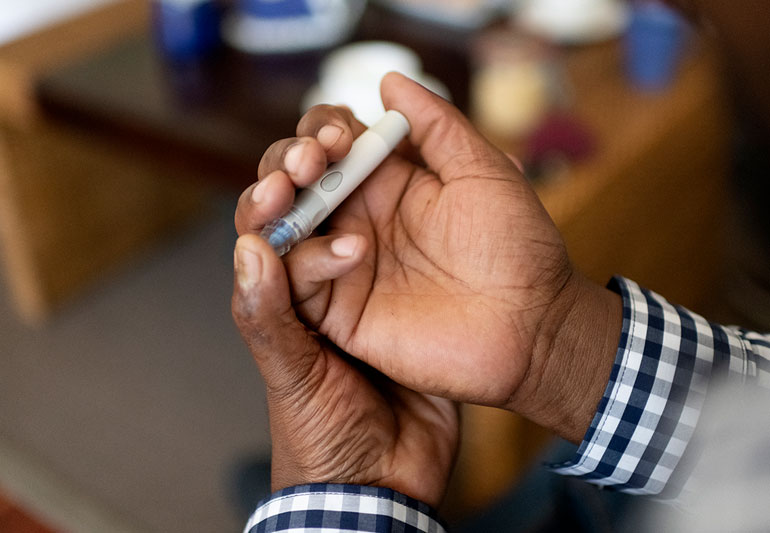

Skipping a meal is typically no big deal. But if you’re a person with diabetes, skipping meals or a lack of meal structure could result in dangerously low or high blood sugar levels. It is important to know your numbers especially when taking certain medications to lower blood sugar levels.
Fueling our body with at least three meals a day is beneficial in diabetes and weight management, says registered dietitian Carolyn Garvey. However, even an occasional missed meal can throw off the balance between food intake and certain diabetes medications. The result is blood sugars that are too low (hypoglycemia) or too high (hyperglycemia) — and that can be dangerous.
“If you take medications for diabetes that can cause low blood sugars, you should try not to skip meals,” says Garvey. “If you’re just not up to eating on a regular schedule, talk to your doctor about diabetes medications that won’t cause low blood sugars,” she says.
Monitoring sugars is vital
When you’re ill or just don’t feel like eating much, it’s important to monitor your blood sugar levels more closely than ever. How often depends on whether you have type 1 or type 2 diabetes and what medications you take.
For type 1 diabetes: Be sure to monitor your blood sugar before meals and before bedtime, typically four times per day, says Garvey.
Beyond that, check your blood sugars if you notice symptoms of low blood sugar. Those symptoms include:
- Hunger.
- Shakiness or nervousness.
- Sweating.
- Dizziness or light-headedness.
- Sleepiness.
- Confusion.
- Difficulty speaking.
- Anxiety.
- Weakness.
For type 2 diabetes: If you’re taking a sulfonylurea medication, check your blood sugars at least twice a day — in the morning and at bedtime.
“It’s important to keep in mind that sulfonylureas may cause your blood sugar to drop during the day if you don’t eat anything after taking your medication,” Garvey says.
If your only treatment is metformin, you may not need to check your blood sugar more than once a day. This medication doesn’t typically cause hypoglycemia.
“It’s important to be aware of the symptoms associated with low blood sugars,” says Garvey. “Be ready to check your blood sugar and eat or drink 15 grams of simple sugar such as glucose tablets or 4 ounces of juice to correct a low blood sugar if needed.” This treatment is also recommended for Type 1 Diabetes, she says.
Also watch for high blood sugar
If you’re not eating due to an acute illness like the flu or an infection, it’s also common for your blood sugars to rise.
“When you have diabetes and are acutely ill, you should check your blood sugars up to four times per day, drink plenty of fluids and contact your doctor if your blood sugars are consistently over 250,” Garvey says.
Controlling diabetes when you’re not hungry
If you find that you’re eating less due to an illness or other factors, your medications may need adjusting, so it’s important to talk to your doctor. Meanwhile, here are some general guidelines:
- Mealtime insulin: For mealtime insulin, if you skip the meal, you should also forego the mealtime insulin.
- Long-acting insulin: The dosage for long-acting insulin is not usually based on food intake, so your doctor will not likely recommend a dose reduction.
- Other medications: There are some diabetes medications that will lower your blood sugar when high, but won’t normally cause hypoglycemia. They may or may not need adjustment, depending on how much you’re eating. These medications include metformin, SGLT-2 inhibitors and DPP4 inhibitors.
Watching for symptoms isn’t enough
Although you may think you’ll know from experience when your blood sugar is out of whack, regular monitoring is the only way to truly make sure.
“It’s important to keep in mind that the symptoms of high or low blood sugars may fade away after several years of living with diabetes, especially if your blood sugars haven’t been well controlled,” says Garvey.
“Also, some of the symptoms of high blood sugars and low blood sugars are the same, so it’s important to check your blood sugar first, if possible, before treating it,” she says.
more recommended stories
 Pediatric Crohn’s Disease Microbial Signature Identified
Pediatric Crohn’s Disease Microbial Signature IdentifiedKey Points at a Glance NYU.
 High-Fat Diets Cause Damage to Metabolic Health
High-Fat Diets Cause Damage to Metabolic HealthKey Points Takeaways High-fat and ketogenic.
 Can Too Many Antioxidants Harm Future Offspring?
Can Too Many Antioxidants Harm Future Offspring?Key Takeaways High-dose antioxidant supplementation in.
 Human Antibody Drug Response Prediction Gets an Upgrade
Human Antibody Drug Response Prediction Gets an UpgradeKey Takeaways A new humanized antibody.
 Dietary Melatonin Linked to Depression Risk: New Study
Dietary Melatonin Linked to Depression Risk: New StudyKey Summary Cross-sectional analysis of 8,320.
 Type 2 Diabetes Risk Identified by Blood Metabolites
Type 2 Diabetes Risk Identified by Blood MetabolitesKey Takeaways (Quick Summary) Researchers identified.
 Microglia Neuroinflammation in Binge Drinking
Microglia Neuroinflammation in Binge DrinkingKey Takeaways (Quick Summary for HCPs).
 Durvalumab in Small Cell Lung Cancer: Survival vs Cost
Durvalumab in Small Cell Lung Cancer: Survival vs CostKey Points at a Glance Durvalumab.
 Rising Chagas Parasite Detected in Borderland Kissing Bugs
Rising Chagas Parasite Detected in Borderland Kissing BugsKey Takeaways (At a Glance) Infection.
 Can Ketogenic Diets Help PCOS? Meta-Analysis Insights
Can Ketogenic Diets Help PCOS? Meta-Analysis InsightsKey Takeaways (Quick Summary) A Clinical.

Leave a Comment